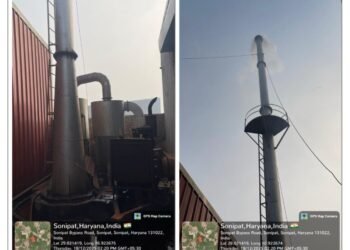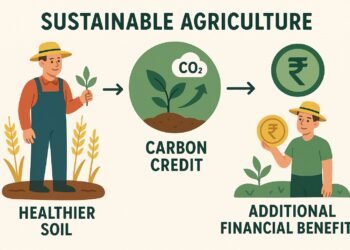New report goes behind the headlines to examine some of the most worrying emerging environmental threats facing the world today, while offering ways to combat them
India CSR News Network
NAIROBI: From the worrying rise in zoonotic diseases around the world to an examination of how climate change is increasing the toxicity of crops, a UNEP report out today seeks to highlight a number of the world’s key emerging environmental issues.
UNEP’s Frontiers report identifies, highlights and offers solutions to six emerging issues, including the threat to human health posed by the alarming amount of plastic waste in our oceans and the crucial role the world’s financial sector can play in driving the planet to a low-carbon, resource-efficient future.
Crop toxicity
 Climate change is already having a major impact on food safety and security. The report looks at how drought and high temperatures can trigger the accumulation in crops of chemical compounds that are toxic to animals and humans. Wheat, barley, maize and millet are among the crops most susceptible to nitrate accumulation, which is caused by prolonged drought. Acute nitrate poisoning in animals can lead to miscarriage, asphyxiation and death, ruining the lives of smallholder farmers and herders.
Climate change is already having a major impact on food safety and security. The report looks at how drought and high temperatures can trigger the accumulation in crops of chemical compounds that are toxic to animals and humans. Wheat, barley, maize and millet are among the crops most susceptible to nitrate accumulation, which is caused by prolonged drought. Acute nitrate poisoning in animals can lead to miscarriage, asphyxiation and death, ruining the lives of smallholder farmers and herders.
Heavy rains that break prolonged drought can also result in the dangerous accumulation of another toxic compound called hydrogen cyanide or prussic acid in crops like flax, maize, sorghum, arrow grass, cherries and apples.
Aflatoxins, which are fungal toxins that can cause cancer and stunt foetal growth, are another emerging problem in crops. The risk of aflatoxin contamination, especially in maize, is expected to increase in higher latitudes due to rising temperatures. A recent study predicts that this toxin will become a food safety issue for Europe, especially in the most likely scenario of a 2oC rise in global temperatures.
Zoonotic diseases
Diseases passed from animals to humans are on the rise. The Frontiers report shows how this rise is closely linked to the health of ecosystems: human activities that encroach on natural habitats enable pathogens in wildlife reservoirs to spread more easily to livestock and humans.
Recent years have seen the emergence of several headline-grabbing zoonotic diseases. These include Ebola, bird flu, Middle East respiratory syndrome, Rift Valley fever and Zika virus disease. The pathogens that cause these diseases have wildlife reservoirs that serve as their long-term hosts. In the last two decades, emerging diseases have had direct costs of more than $100 billion. If these outbreaks had become human pandemics, the losses would have amounted to several trillion dollars, the report states.
Plastic Pollution
The scientific community is racing to understand the impact that the growing amount of microplastics in our oceans is having on various organisms, as well as the risk they pose to human health through the consumption of contaminated food. These tiny plastic particles – between the size of an ant and virus – are found in water systems throughout the world and in the stomachs of everything from zooplankton to whales. A number of studies analyzed in the report are underway to determine the risk this poses to human health.
Financial Sector
The financial sector is not confined solely to enhancing economic growth; it also has a critical role to play in investing in new low-carbon, resource-efficient and environmentally sound assets. It can also help shift capital away from traditional assets that damage the environment. The report presents a number of emerging financial initiatives that offer innovative solutions that can bring about sustainable change, including Unilever’s “Sustainable Living Plan”, which pledges to cut the company’s damaging environmental impact in half by 2020 while vowing to improve the health of one billion people. By the end of 2014, Unilever had already reduced the amount of greenhouse gas emissions that its factories produce by 37 per cent compared to 2008 levels, highlighting the power of the financial sector to bring about positive environmental change.
Climate Change
The report highlights two critical issues associated with climate change – loss and damage. Given the delays in the last 25 years in mitigating and adapting to climate change, scientific evidence suggests that losses and damages from climate change are inevitable, with profound consequences for ecosystems, people, assets and economies. This is already happening. The heat waves of 2003 are a good example of what happens when efforts to mitigate and adapt to changes in the climate fail: 30,000 people died, glaciers decreased, permafrost thawed and the European Union’s agricultural sector lost $14.7 billion.
The report examines a number of other case studies on recent sudden and slow-onset events that have caused losses and damages to ecosystems and presents a range of tools that will help manage these problems in the future.
You can download a copy of the report here: http://web.unep.org/frontiers/
Photo Credit: http://coastalcare.org/wp-content/uploads/2009/11/plastic-pollution-coastal-care-norway-584×380.jpg



















